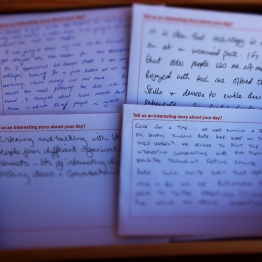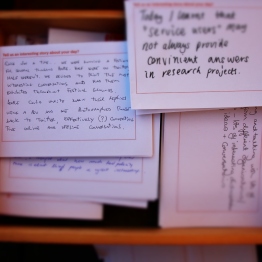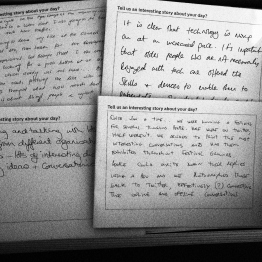Age Friendly Cities
On Monday 1st of June I got up very early and took the train from King’s Cross up to Leeds for my first ever ‘unconference’. This was Age Camp Leeds, held at the Carriage Works Theatre and dedicated to the topic of creating an ‘age friendly city’.
For those of you who have never been to one, an ‘unconference’ is effectively a conference with a defined focus – in this case ‘age friendly cities’ – but no fixed programme or agenda. The idea is for people to turn up and ‘pitch’ a session, and for the programme to emerge organically as a reflection of the things that people want to talk about rather than what a programmer selects as worthy. It sounds chaotic but in practice feels spontaneous and liberating – a way of developing a conference programme led by its attendees and by the needs of the people in the room.
I was there to pitch a session based on my project Bloomsbury Festival in a Box: engaging socially isolated people with dementia. Indeed I had dragged the ‘FIAB’ itself up from London in order to show it to people and (hopefully) to run a quick workshop that would create a ‘festival in a box’ or ‘social memory box’ for the unconference itself – just as I did in a different way for the Luminate Festival of Creative Ageing in Edinburgh last October.
My Session
After everyone had arrived and got settled, we were invited to pitch sessions or raise issues that we would like to see addressed. I was very pleased at this point to observe the mixture of people in the room: from the public and cultural sectors, digital technologists and, importantly, an impressive number of older Leeds residents there to speak for themselves.
I pitched my session and it was added to the programme in an afternoon slot called ‘Festival in a Box: taking culture into peoples’ homes’. In this session tried to give an overview of the FIAB project and some of the things that worked (as well as some that didn’t), before moving on to a more practical session that created a ‘festival in a box’ resource for the conference itself. I took people through the overall structure of the research project and got a lot of feedback in doing so from people who had run similar arts and health initiatives across the country. People asked some probing questions – particularly about what it actually means to link a festival with an outreach activity. How strong does the link have to be between ‘festival’ and ‘box’?
Tell Us an Interesting Story: an Unconference in a Box
I tried to demonstrate how, for the FIAB project, we had worked to create a social memory box which captured something of the ‘structure of feeling’ of the Bloomsbury Festival, looking for the ‘small stories’ woven into the broader festival text.
To demonstrate this, I asked people to fill in some of the same forms that we used for the first FIAB outreach sessions – focusing particularly on the challenge to ‘Tell Us An Interesting Story About Your Day’. I have run this basic workshop a few times now, and ever since the first attempt at the Bloomsbury Festival in October 2013
I am always amazed at how effective this simple exercise can be. Inspired in part by the Mass-Observation movement of the 1930s and 40s, and its attempts to document the ‘everyday surrealism’ embedded in the most quotidian experiences –the basic point of this exercise as I see it is to highlight the inherent complexity, the multitude of perspectives, memories and individual stories, embedded in a shared experience and moment in time.
Here are some of the ‘Interesting Stories’ that were donated to the Age Camp ‘Festival in a Box’:
I forgot to bring any money so had to ask a very senior member of the council to buy my lunch. But after he had done so, and we had sat down I saw an old friend in the café who I could have asked!
It is clear that upbringing in the 1930s and 2010s must have marked differneces on the attitudes of those born so far apart […] compare today’s technology (used by 3yr olds) & papers and pen et al of the 1930s. No comparison… Long memories are great to see how attitudes have changed
Wasps make paper/ Ants make sugar/ Pigs lay sausages/ Ducks recycle bread
Interesting Stories
This is just a small selection of the ‘interesting stories’ told by attendees at my workshop, and which now make up my unconference ‘festival in a box’. They give a sense of the different human perspectives at play in the room: the everyday experiences and dramas that have led people to take part, their journeys to and from the event, the encounters and moments of inspiration on the way. These are the stories, the playful observations, critical perspectives, differences of opinion and even perhaps some of the angers and frustrations that come together to make up an event.
Other than simply being ‘interesting’ in themselves these stories serve to demonstrate something of the human complexity underlying totalising narratives of place, time, community. During the Bloomsbury Festival in a Box project it seemed important to gather and preserve some of these stories from our participants precisely because they were endangered – by old age, by memory loss, and even by the increasing scarcity of social housing in central London. That urgency has not gone away of course, and indeed in the current political climate (a shadow that loomed large in this largely public-sector gathering in Leeds) may be becoming more urgent than ever.




Recent Comments